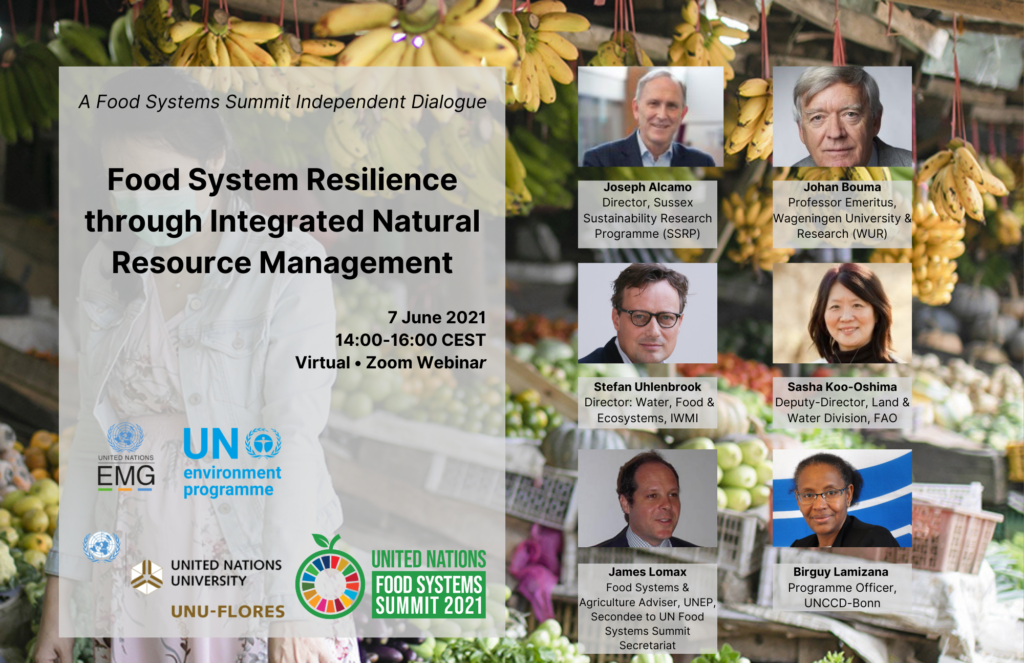Webinar // Food System Resilience through Integrated Natural Resource Management
As part of the UN Food Systems Summit Dialogues, UN Environment Management Group (EMG) in collaboration with UNU-FLORES organises a virtual Nexus Dialogue on food system resilience through integrated natural resource management.

About the event
In 2021, UN Secretary-General António Guterres will convene a Food Systems Summit as part of the Decade of Action to achieve the Sustainable Development Goals (SDGs) by 2030. The Summit will launch bold new actions to deliver progress on all 17 SDGs, each of which relies to some degree on healthier, more sustainable, and equitable food systems.
Against this background, the the UN Environment Management Group (EMG) in close collaboration with Dr Serena Caucci and Dr Lulu Zhang (Associate Programme Officers, UNU Institute for Integrated Management of Material Fluxes and of Resources (UNU-FLORES) ), organises "Food System Resilience through Integrated Natural Resource Management - Nexus Dialogue" as an independent dialogue of the Food System Summit.

Welcoming Remarks
- Hossein Fadaei, Head of Office-Geneva, EMG Secretariat
- Dr David M. Malone, Rector of the United Nations University; Under-Secretary-General of the United Nations
- Prof. Edeltraud Guenther, Director, UNU-FLORES
Speakers
- Prof. Joseph Alcamo, Director of Sussex Sustainability Research Programme (SSRP)
- Dr Sasha Koo-Oshima, Deputy-Director, Land & Water Division, FAO
- Prof. Stefan Uhlenbrook, Strategic Program Director: Water, Food & Ecosystems, IWMI
- Prof. Johan Bouma, 2017 Alexander Von Humboldt Medal, Professor Emeritus, Wageningen University & Research (WUR)
- James Lomax, Programme Officer, Sustainable Food Systems and Agriculture, UNEP
- Dr Birguy Lamizana, Programme Officer, UNCCD-Bonn
Registration
Click here to register for the webinar taking place via Zoom.
Background
The current world is afflicted with crises that affect the integrity of our food systems’ sustainability. This includes its capability to provide nutritional and quality foods, decent livelihood opportunities, and the biological diversity’s capacity to produce renewable, ecological yield. The crises are myriad and nuanced, with unclear triggers and trajectories – ranging from land-use agricultural production to food processing through waste management. However, its socioeconomic impacts are evident.
Transforming global food systems has the potential to guarantee a just society that would address human health, reduce environmental pollution, and secure fundamental rights for communities.
In recognising that food systems are simultaneously the cause and effect of layered variables and interactions, the Nexus Dialogue seeks to investigate the accelerating effect of Integrated Natural Resource Management (“INRM”). With the aim of detangling complexity and enhanced by Circular Bioeconomy (“CBE”) strategies, the Dialogue focuses on INRM’s impact on poverty, health, and climate.
The Nexus Dialogue’s strategic positioning ahead of the Food System Summit provides momentum for stakeholders to reflect on the interconnectedness of INRM and the Circular Bioeconomy.
Download
Please, download here the concept note and agenda of the event.
More information
For more information about the event, check EMG's website or follow follow EMG on Facebook, Twitter, Youtube and LinkedIn.
Related News and Articles
- Water, Land and Ecosystems 2017-2018 Research Highlights // Solutions for Thriving Ecosystems
- Policy Brief // Economic Growth and Resource Use: Exploring the Links
